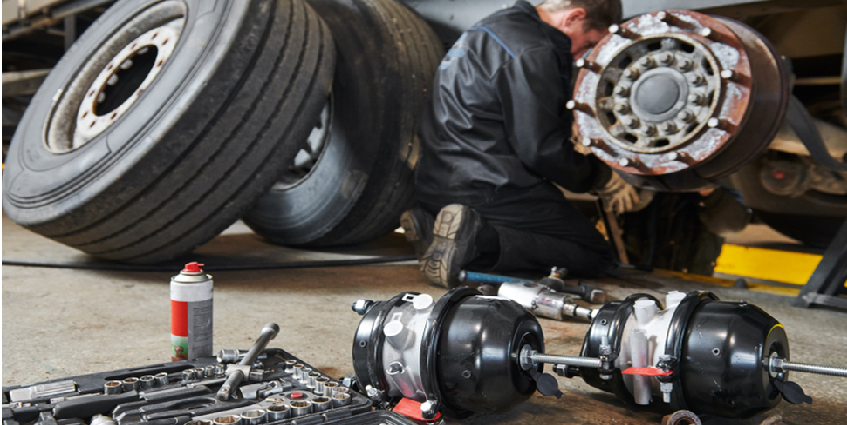Winter is over, but your vehicle will continue to feel the effects for months unless you properly clean it. Dirt, soot, salt, fuel deposits and rust can clog crucial passageways throughout the engine, disrupting the flow of air, oil and fuel. Most vehicles also need seasonal adjustments that improve performance now that the roads are clear and your fluids are no longer at risk of freezing.
Cold weather tends to be especially rough on diesel engines, which use compression and heat to trigger combustion instead of an electrical spark. When the temperature drops, the engine has to work harder to convert the fuel and air into mechanical energy. Although these workhorses can last a lifetime, many components and systems need to be replaced every few years, especially after a long winter or heavy towing season.
Neglecting problems left over from the winter can lead to expensive repairs and lengthy delays as the economy and transportation sector pick up steam. Keep commonly used diesel parts in stock to fix issues as they occur instead of waiting for them to get worse.
Replace your rusted or worn parts with better versions of what you had before. Use Xtreme Diesel Performance products to make the most of your repairs. Their gear is made for the hardest working vehicles to ensure they last a million miles or more.
Car spring cleaning prioritizes preventative maintenance, so you can keep trucking all summer long. Use these spring cleaning tips to help your vehicle forget winter ever happened.
Cleaning the Car Inside and Out
They don’t call it spring cleaning for nothing. Wash the car’s exterior and interior. The salt used to melt snow in the winter corrodes metal. Use vinegar to expunge any residue from the wheels, fenders and undercarriage.
Vacuum and wash the floors, seats and mats to remove all the dirt you’ve tracked inside over the past few months. Wipe down surfaces to remove bacteria. Clean moist areas that can turn into mold. Get rid of stains and strange odors that reduce air quality.
Clean under the hood, including in and around the engine bay. Remove any burnt fluids and stains that make it harder for the engine to breathe. Keeping the inside spotless helps you detect leaks in the future.
Change the Filters
Changing the oil and oil filter should be part of your routine, but the spring changeover may be the most important. Cold weather causes the oil to gel, making it hard to pump through the engine. Giving your engine a fresh batch of oil with a clean filter lubricates well-worn parts to prevent grinding and friction.
Don’t stop with the oil filter; your fuel filter should also be replaced. Gas stations will start swapping out their winter blend for higher concentrations of B20. Fuel deposits can overwhelm the filter when you first run biodiesel through the engine, reducing flow and efficiency.
Test the Turbocharger
You might have trouble boosting after a long winter. Water and dirt in the oil can clog the turbo actuator, the release valve that diverts excess air once it reaches the correct PSI. Replace the turbo actuator to avoid wasting compressed air, which limits your power output.
Inspect the Cooling System
Your radiator and coolant system are about to get a workout as temperatures continue to rise. Look for cracks in the coolant hose and radiator caused by temperature fluctuations, which can cause leaks. There could also be frozen antifreeze in the tank leftover from winter that needs to be removed. Now’s a good time to flush the coolant system and replace it with fresh fluid.
Check the Battery
Diesel engines need electricity to start, but cold weather can weaken your battery, reducing voltage and delaying start times. The battery uses glow plugs to warm the fuel before it gets injected into the combustion chamber. Check the battery’s output to see if it has lost power over the last few months. Clean the connection terminals to prevent rust and structural damage. Consider replacing the battery if it’s low to get the engine firing on all cylinders.
Service the Fuel System
Driving around with too much water in your fuel supply will damage the fuel injectors and tank, leading to rust and corrosion. The water separator is designed to remove the H20 from the fuel before it reaches the engine. It tends to be busiest during the winter as water sinks to the bottom of the tank. It’s best to drain the water separator weekly. You will also see a warning light when the separator contains around 6.76 fl. oz. (200 ml) of water.
Replace your fuel injectors if they look clogged or dirty from extra soot and water. Monitor the fuel pressure, efficiency and acceleration times to see if they’re firing correctly.
Switch Out Your Tires
Melting ice and snow means more traction on and off the road. Look over the tire tread to see if some areas are more worn down than others, which could lead to sliding in rainy weather. Tire pressure increases in warm weather, risking overinflation. Adjust the PSI according to the manufacturer’s guidelines.
Car maintenance should happen all year round, but your spring checkup is arguably the most important as your vehicle heats up. Fluids, parts and systems are susceptible to temperature changes that affect handling, reliability and performance. Use these tips to welcome spring with open arms.

